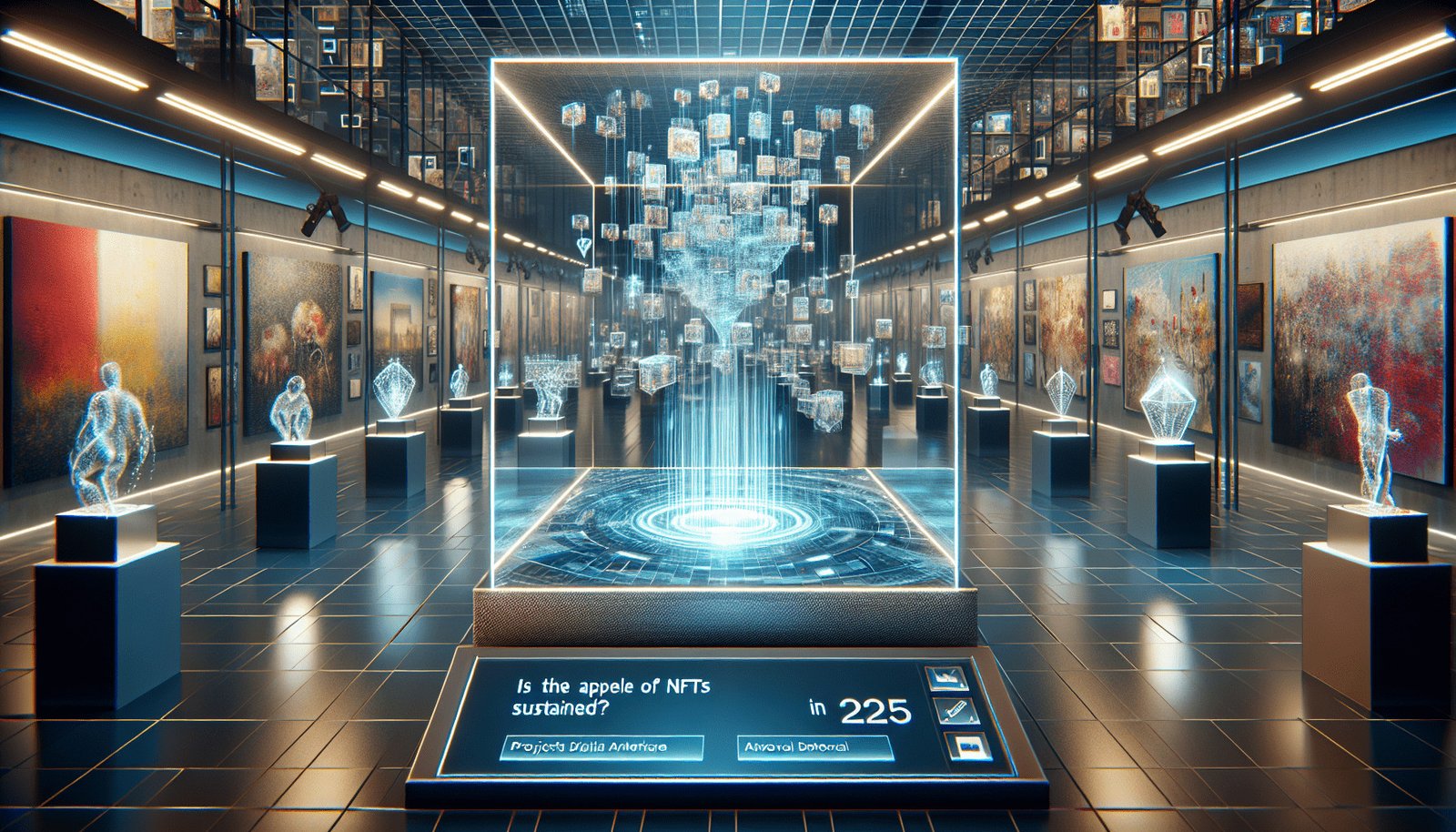Have you ever wondered if NFTs are still making waves as we step into 2025? It’s fascinating how technology evolves and trends shift over time. As someone who’s curious about the ever-changing landscape of digital assets, exploring the popularity and utility of NFTs today is quite essential. Let’s take a journey through the world of Non-Fungible Tokens to see where they stand now, and later, we’ll also unravel the basics of decentralized exchanges (DEX) in the digital realm. So, buckle up and let’s navigate these intriguing digital waters together.

What Are NFTs?
Non-Fungible Tokens, or NFTs, are unique digital assets verified using blockchain technology. Unlike cryptocurrencies such as Bitcoin or Ethereum, which are fungible, meaning each unit is the same as any other, NFTs are one-of-a-kind. Think of NFTs as digital certificates of authenticity representing ownership of a specific item, be it a piece of art, music, or even a tweet.
Historical Perspective on NFTs
The journey of NFTs began before 2020, but they truly gained momentum during the pandemic when digital interactions became the norm. Artists and creators found a new way to monetize their work, and collectors discovered a modern medium for acquiring unique pieces. The exponential growth witnessed in 2021 was fueled by high-profile sales and celebrity endorsements. However, the market’s volatility has led many to question their current standing.
NFTs in 2025: Are They Still Popular?
Fast forward to 2025, and the question arises: Are NFTs still popular? While initial hype may have cooled, NFTs continue to maintain a substantial presence in several sectors, including art, gaming, and real estate.
The Art Market
NFTs revolutionized the art world by providing artists with direct access to buyers, reducing reliance on galleries and auction houses. By 2025, digital art sold as NFTs persists as a key revenue stream for artists. The technology facilitates fractional ownership, allowing multiple individuals to own a piece of high-value artwork collectively. This democratization has expanded the buyer base significantly.
Gaming and NFTs
In the gaming industry, NFTs play a pivotal role in virtual economies. Gamers can own, trade, and sell in-game assets such as skins, weapons, and characters, all verified by blockchain. The seamless integration of NFTs into gaming ecosystems enhances player interaction and investment. By 2025, major gaming companies have integrated NFT marketplaces within their platforms, solidifying NFTs as a primary feature of modern gaming.
Real Estate and NFTs
The real estate sector has started leveraging NFTs for property transactions. NFTs can represent digital deeds, simplifying transfers and reducing associated costs. In 2025, virtual real estate markets, where users purchase and monetize digital land through NFTs, have emerged parallel to traditional markets.
Music and Entertainment
NFTs have reshaped the music industry, providing artists with a new way to connect with fans through exclusive content. Musicians release unique tracks or behind-the-scenes footage as NFTs, offering fans a sense of ownership and participation. By 2025, NFTs are integral to fan engagement and revenue models in the music world.
Challenges Facing NFTs in 2025
Several challenges remain. Environmental concerns persist due to the energy-intensive nature of blockchain technologies, though strides in green technologies offer promise. Legal frameworks and regulations around NFTs are still catching up, causing uncertainty in various jurisdictions. Consumer education also remains critical, as users navigate the complexities of digital ownership.

How Do You Use a Decentralized Exchange (DEX)?
Decentralized exchanges (DEXs) offer a revolutionary way to trade cryptocurrencies. Unlike centralized exchanges, DEXs operate without an intermediary, allowing peer-to-peer trading directly through smart contracts on the blockchain. This shift toward decentralization brings with it numerous benefits but also requires a steep learning curve.
Understanding the Basics of a DEX
A DEX is essentially a platform where cryptocurrency transactions occur directly between users. It eliminates the need for a central authority or middleman, ensuring that users maintain control over their assets. By 2025, popular DEXs include platforms like Uniswap, SushiSwap, and PancakeSwap, each offering unique features catering to various trading needs.
Advantages of Using a DEX
Using a DEX offers several advantages:
- Privacy: As there’s no central entity collecting user data, your privacy is better protected.
- Security: Users hold onto their private keys, reducing the risk of hacks associated with centralized exchanges.
- Access to DeFi Tokens: DEXs often list new and emerging tokens before centralized exchanges, providing opportunities to invest early.
- Global Access: Without geographical restrictions, users worldwide can participate freely.
Step-by-Step Guide to Using a DEX
Navigating a DEX may initially seem daunting, but with a clear roadmap, you can trade confidently.
Set Up a Wallet: Before accessing a DEX, you need a compatible cryptocurrency wallet like MetaMask or Trust Wallet, linked to your browser or device.
Fund Your Wallet: Deposit cryptocurrency into your wallet. Ether (ETH) is commonly used, especially for Ethereum-based DEXs. Ensure you have sufficient funds to cover transaction fees.
Connect to the DEX: Visit the DEX’s website and connect your wallet. This action is straightforward; simply follow the on-screen prompts.
Choose the Tokens You Wish to Trade: Search for the trading pair you want to exchange, such as ETH/DAI, and input the amount you wish to trade.
Review the Transaction: Check the details, including potential slippage and fees. Slippage refers to the difference between expected and actual transaction prices due to market fluctuations.
Confirm the Trade: Confirm the transaction within your wallet. Once approved, the trade is executed, and the tokens are deposited into your wallet.
Potential Pitfalls and How to Avoid Them
While DEXs offer many benefits, they have their pitfalls:
- Impermanent Loss: In liquidity pools, when the price of deposited tokens changes, the value can diminish compared to holding the assets separately.
- High Fees: Network congestion, especially on Ethereum, can result in high transaction fees.
- Phishing Attacks: Always ensure you’re on the official DEX website to avoid malicious replicas.
To mitigate these risks, stay informed about the platforms you’re using, double-check all details before confirming transactions, and consider using layer-2 solutions or other blockchains with lower fees.

Future Prospects and Innovations
Looking ahead, the world of NFTs and decentralized exchanges is brimming with potential innovations. The emphasis on sustainability is likely to grow, with new technologies aimed at reducing the environmental footprint of blockchain operations. Cross-chain capabilities are expected to enhance usability, enabling effortless transactions across different blockchain networks.
Developers are focusing on improving user experiences, making platforms more intuitive and accessible to wider audiences. Furthermore, regulatory clarity is anticipated, providing safeguards while fostering innovation.

Conclusion
In 2025, NFTs persist as a prominent feature across various industries, continually evolving and integrating into new realms. Meanwhile, decentralized exchanges champion the cause of privacy and autonomy in cryptocurrency trading, although challenges remain. Both domains are testament to the rapid pace of technological evolution, promising to open up unprecedented possibilities in the digital world. As you navigate these landscapes, staying informed and forward-thinking will be your greatest asset.

